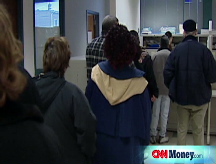Bottom's up for stocks?
There's no denying that the economy is in terrible shape. But investors may finally have priced all the bad news into the market.
NEW YORK (CNNMoney.com) -- At risk of sounding like a broken record record record, here goes: Has the market finally bottomed?
Well, there are some decent reasons to suggest that it long last has.
For one, you had the market's rally last Wednesday, which picked up steam in the late afternoon and was attributed by some investing experts to the fact that Bill Miller, the Legg Mason Value Trust manager most well-known for beating the S&P 500 for 15 straight years, said the worst was probably over.
Now that seems a bit of an odd reason for a market surge since Miller has lost a lot of his luster in the past few years. His fund is down 58% year-to-date due to bad bets on many financial stocks.
Still, if traders were willing to buy just because Miller - who is almost always bullish - was calling the bottom, that could be a sign that investors may finally be experiencing seller's fatigue and are looking for any excuse to rally.
"Investors are just latching on to any shred of silver linings now. Expectations may have been way overblown to the downside," said Jack Ablin, chief investment officer Harris Private Bank. "If you look at sentiment, it may be hard for things to get worse."
Then there's Freaky Friday. The markets initially plunged after the government reported the worst monthly job loss in 34 years, but went on to enjoy a nice end-of-the day rally.
"Instead of tumbling, the market rallied on the jobs report. That came as a surprise to some," said Alan Skrainka, chief market strategist with Edward Jones in St. Louis. "But bad news on Main Street can be good news on Wall Street because people begin to understand that the market discounts the bad news."
To that end, Skrainka pointed out that the last time the nation lost more jobs than in November was in December 1974 - a month that turned out to be the bottom of the bear market which accompanied the painful recession that lasted from November 1973 through March 1975.
The good news has so far extended to Monday as well, with the Dow up nearly 4% in late-afternoon trading.
It appears investors are taking solace from stimulus plans proposed by President-elect Barack Obama as well as hopes that Detroit's Big Three automakers may get some money to keep them afloat for the next few months.
But the best thing that may have happened to investors was the long overdue recognition by the National Bureau of Economic Research that the United States is in a recession and that the downturn began in December 2007.
Even though this recession is likely to last longer than most, there are growing expectations that the worst quarter during this downturn is likely to be the current one, and that the economy could show some signs of stabilizing in the middle of 2009.
And typically, stocks tend to head higher in anticipation of a recovery, despite a steady stream of bad news.
So if investors wait for concrete evidence of an economic rebound, they risk missing out a boost in stock prices that is probably going to take place before that.
"Investors using poor economic data as a reason to exit the market or better economic data as a signal to re-enter the market are likely to be disappointed by the performance of this approach," wrote Bill Stone, chief investment strategist with PNC Wealth Management in Philadelphia in his December note to clients.
Still, there are many reasons to be worried as well. The market volatility is gut-wrenching and we've already been through several big rallies that quickly petered out.
Skrainka warns he won't have real confidence that the worst is over until financial stocks prove that they can stabilize.
Ablin said the credit markets need to thaw even further. He's also concerned because the market rally has not been accompanied by a similar move in corporate bonds, which he believes would show further confirmation that investors believe the worst may be over for many companies.
But the market has been hit so hard that even one of the most well-known bears is finally starting to change his tune.
William Fleckenstein, president of Fleckenstein Capital, a Seattle-based investment firm that has primarily engaged in short selling - the practice of borrowing stocks and selling them with the hopes of buying them back later a lower price - said Monday that he is in the process of closing down his short-only hedge fund.
To be sure, he said he isn't rushing out to go buy stocks today. In fact, he thinks the markets will probably head lower still. But he said there are less reasons now to be fully short, and that next year will be a good time to sift through the wreckage for bargains.
"Given what's already transpired, I don't want to run a short-only fund anymore because I feel it's possible to return to the long side and have some margin of safety," Fleckenstein said. "A lot of stocks have been beaten up and there are some opportunities on the long side." ![]()




